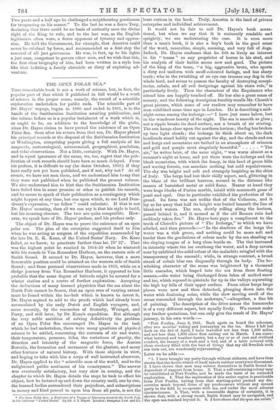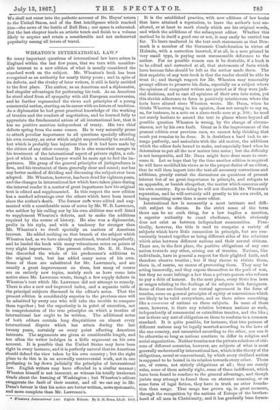THE OPEN POLAR SEA.* Tins remarkable book is not a
work of science, but, in fact, the popular part of that which if published in full would be a work of science in the proper sense, namely, the record of a scientific exploration undertaken for public ends. The scientific part of Dr. Hayes' voyage, begun in 1860 and ended in 1861, is in the hands of the Smithsonian Institution awaiting publication, and the volume before us is a popular instalment of a work which is, or ought to be, an addition to the knowledge of the globe, since Dr. Hayes claims to have proved the existence of an Open Polar Sea. Soon after his return from that sea, Dr. Hayes placed his principal records at the disposal of the Smithsonian Institution at Washington, comprising papers giving a full analysis of his magnetic, meteorological, astronomical, geographical, pendulum, and tidal observations. Not a little, certainly. With Dr. Hayes, and in equal ignorance of the cause, we, too, regret that the pub- lication of such records should have been so much delayed. From his preface, it is difficult to say (he dates October, 1866) if they have really not yet been published, and if not, why not ? At all events, we have not seen them, and we understand him to say that they were not published when he published the present volume. We also understand him to hint that the Smithsonian Institution have failed him in some promise or other to publish his records, and he seems to speak of their publication as a contingency which might happen at any time, but one upon which, to use Lord Dun- dreary's expression, "no fellow" could calculate. If that is not Dr. Hayes' meaning, then all we can say is that his style is lucid, but his meaning obscure. The two are quite compatible. How- ever, we speak here of Dr. Hayes' preface, and his preface only.
The object of Dr. Hayes was to prove the existence of an open polar sea. The plan of the enterprise suggested itself to him when he was acting as surgeon of the expedition commanded by the late Dr. E. K. Kane, of the United States' Navy. Dr. Kane failed, as we know, to penetrate further than lat. 78° 87'. That was the highest point he reached in 1854-55 when he wintered with his vessels in Van Rensselaer Harbour, on the eastern aide of Smith Sound. It seemed to Dr. Hayes, however, that a more favourable position could be attained on the western side of Smith Sound ; and from personal observations made in 1853, while on a sledge journey from Van Rensselaer Harbour, it appeared to him probable that the same degree of latitude might be secured for a winter station and a centre of further exploration. Accepting the deductions of many learned physicists that the sea about the North Pole cannot be frozen, that an open area of varying extent must be found within the ice-belt which is known to invest it, Dr. Hayes aspired to add to the proofs which had already been accumulated by the early Dutch and English voyagers, and, more recently, by the researches of Scoresby, Wrangel, and Parry, and still later, by Dr. Kane's expedition. But although the very noble ambition of solving definitively the problem of an Open Polar Sea encouraged Dr. Hayes in the task which he had undertaken, there were many questions of physical science to be settled, concerning the currents of air and water, their temperature, pressure, tides, the variations of gravity, the direction and intensity of the magnetic force, the Aurora Borealis, the formation and movement of the glaciers, and many other features of natural history. With these objects in view, and hoping to take with him a corps of well instructed observers, Dr. Hayes applied to the " scientific men of the world, and to the enlightened public sentiment of his countrymen." The answer was eventually satisfactory, but very slow in coming, and the chapter in which Dr. Hayes details the steps he took to effect his object, how he lectured up and down the country until, one by one, the learned bodies surrendered their prejudices, and subscriptions in money and kind poured in upon him from all parts, is not the
• The Open Polar Sea: a Narrative of a Voyage of Discovery towards the North Pole, in the Schooner " United States." By Dr. L L Hsyse. London: Sampson Low and Co.
least curious in the book. Truly, America is the land of private enterprise and individual achievement.
It would not be fair to call Dr. Hayes's book sensa- tional, but when we say that it is eminently readable and sprightly, we are understating the ease. It is even more than a man's book, it is also a boy's book in the good sense of the word, masculine, simple, amusing, and very full of dogs.. Indeed, Dr. Hayes confesses that he. felt as lively an interest in his " teams " as any proprietor of horses in his stud, and
his analysis of their habits seems new and good. The picture of the king of the team, " a big, aggressive brute, who sports. a dirty red uniform with snuff-coloured facings, and has sharp teeth ; who in the twinkling of an eye can trounce any dog in the whole herd, and seems to passess the faculty of destroying conspi- racies, cabals, and all evil designings against his stern rule," is particularly lively. Then the characters of the Esquimaux who
attend him are happily touched off. He has also a great sense of scenery, and the following description forcibly recalls Mr. Church's great picture, which some of our readers may remember to have seen exhibited some time ago in London. He is describing a mid- night scene among the icebergs:—" I have just come below, lost in the wondrous beauty of the night. The sea is smooth as glass ; not a ripple breaks its dead surface, not a breath of air stirring.
The sun hangs close upon the northern horizon ; the fog has broken
up into light clouds ; the icebergs lie thick about us, the dark headlands stand boldly out against the sky, and the clouds and sea and bergs and mountains are bathed in an atmosphere of crimson and gold and purple most singularly beautiful." " The air," he writes later, of the same night, " was warm almost as a summer's night at home, and yet there were the icebergs and the bleak mountains, with which the fancy, in this land of green hills.
and waving forests, can associate nothing but cold repulsiveness. The sky was bright and soft and strangely inspiring as the skies of Italy. The bergs had lost their chilly aspect, and, glittering in the blaze of the brilliant heavens, seemed in the distance like masses of burnished metal or solid flame. Nearer at hand they were huge blocks of Parian marble, inlaid with mammoth gems of pearl and opal. One in particular exhibited the perfection of the grand. Its form was not unlike that of the Coliseum, and it lay so far away that half its height was buried beneath the line of blood-red waters. The sun, slowly rolling along the horizon, passed behind it, and it seemed as if the old Roman ruin bad suddenly taken fire." Dr. Hayes here pays a compliment to the truth of Church's picture of " The Icebergs," to which we have alluded, and then proceeds :—" In the shadows of the bergs the water was a rich green, and nothing could be more soft and tender than the gradations of colour made by the sea shoaling on the sloping tongue of a berg close beside us. The tint increased in intensity where the ice overhung the water, and a deep cavern near by exhibited the solid colour of the malachite mingled with the transparency of the emerald ; while, in strange contrast, a broad streak of cobalt blue ran diagonally through its body. The be- witching character of the scene was brightened by a thousand little cascades, which leaped into the sea from these floating masses,--the water being discharged from lakes of melted snow and ice, which reposed in quietude far up in the valleys separating the high icy hills of their upper surface. From other bergs large pieces were now and then detached, plunging down into the water with deafening noise, while the slow moving swell of the ocean resounded through the archways,"—altogether, a fine bit of painting. The description of the drive across the hummocks is of a very different aspect, but equally lively. We cannot make any further quotations, but can only give the result of Dr. Hayes' journey, in his own words :-
"Port Foulke, June 3, 1861. Back again on board the schooner, after two months' toiling and journeying on the ice. Since I left her deck on the 3rd of April, I have travelled not less than 1,300 miles, and not less than 1,600 since first setting out in March. I am some- what battered and weather-beaten, but a day or so of rest and civilized comfort, the luxury of a wash and a bed, and of a table covered with clean crockery filled with the best of things that my old Swedish cook can turn out, are wondrously rejuvenating."
Later on he adds :— "1. I have brought my party through without sickness, and have thus. shown that the Arctic winter of itself breeds neither scurvynordiscontent.. 2. I have shown that men may subsist themselves in Smith Sound in- dependent of support from home. 3. That a self-sustaining colony may be established at Port Foulke, and be made the basis of an extended exploration. 4. That the exploration of this entire region is practicable from Port Foulke, having from that starting-point pushed my dis- coveries much beyond those of my predecessors without any second party in the field to co-operate with me, and under the moat adverse circumstances. 5. That, with a reasonable degree of certainty, it is shown that, with a strong vessel, Smith Sound may be navigated, and the open sea reached beyond it. 6. I have shown that the open sea exists."
We shall not enter into the pathetic account of Dr. Hayes' return to the United States, and of the first intelligence which reached him—the news of the battle of Bull Run ; our space is exhausted. But the last chapter lends an artistic touch and finish to a volume likely to acquire and retain a considerable and not undeserved popularity among all lovers of travel.































 Previous page
Previous page